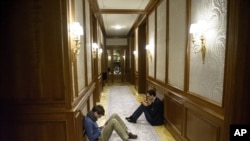U.S. Secretary of State John Kerry will stay in Switzerland at least until Thursday morning to keep talking with Iran on a nuclear deal.
"We continue to make progress," State Department spokeswoman Marie Harf said late Wednesday in Lausanne, Switzerland, "but have not reached a political understanding."
Negotiators from Iran and major six world powers missed their self-imposed midnight Tuesday deadline to close the remaining gaps in a framework deal to curb Iran's nuclear program in exchange for sanctions relief.
But the two sides agreed to keep talking. Meetings continued Wednesday between Iranian Foreign Minister Mohammad Javad Zarif and his counterparts from the United States, Britain and Germany. Senior representatives from France, Russia and China also are taking part, though their foreign ministers left the talks earlier.
Iran's chief nuclear negotiator, Abbas Araqchi, told Iranian state television that his delegation insists on having an outline in place for lifting all of the sanctions imposed by the United Nations and Western countries before it agrees to a deal. Other sticking points included stipulations about research and development.
Russian state media quoted Foreign Minister Sergei Lavrov saying late Tuesday the two sides had agreed in principle on the "key elements" of a deal, which would include measures to ensure Iran's nuclear program is peaceful in return for lifting economic sanctions.
Earlier Wednesday, China urged both sides to consider compromises.
"All parties must be prepared to meet each other halfway in order to reach an agreement," a Chinese statement said.
Progress made
The goal is to agree on a framework deal and then give technical experts until June 30 to draft a detailed agreement, potentially ending more than a decade of dispute over Iran’s nuclear program.
The accord is supposed to verifiably guarantee the program is purely peaceful, as Iran claims, and gradually lift a complex web of international economic sanctions.
As yet, the talks have not yielded a sequence that satisfied Iran’s desire for fast relief and the international negotiators’ desire to ensure Iran could not evade its commitments after sanctions end.
Iran still has not met United Nations Security Council demands for a full accounting of its past secret nuclear weapons program.
Netanyahu calls for 'better deal'
In Israel, Prime Minister Benjamin Netanyahu said that the group of world powers needs to insist on a "better deal" with Iran, and that it's making concessions that could endanger Israel and world peace.
Many in the international community worry that Iran could do the same thing again once it is clear of the sanctions, particularly after this agreement expires, expected in 10 to 15 years.
But experts say the emerging accord would provide for extensive inspections, ensuring that does not happen over the long term.
"I think it’s important to acknowledge that some of the monitoring and verification in an agreement will be permanent," said Kelsey Davenport of the Arms Control Association in Washington.
Monitoring, verification program
Davenport noted that as part of the deal, Iran is expected to ratify what is called the Additional Protocol of the Nuclear Nonproliferation Treaty.
"That will give the international community far greater access to Iran’s nuclear facilities, and also access to undeclared sites," she said. "It will also give inspectors much more latitude to investigate areas if they think that illicit nuclear activities have taken place there. Any deviations would be very quickly detected."
At Georgetown University, Ariane Tabatabai agrees that critics of the negotiations do not give enough credence to the International Atomic Energy Association’s monitoring and verification program, even though Iran has cooperated with it since the preliminary accord was reached a year and a half ago.
"I think that is perhaps the least talked about and the most important part of a deal," she said. "For the most part, people who talk about the Iran talks don’t necessarily know much about the monitoring system. People don’t necessarily know what the IAEA is doing. It’s not something you can grasp as easily."
One thing critics can grasp is that the deadline for agreement on the main points already has been missed by at least one day. They'll be looking at whatever comes out of these talks to try to figure out who made the final concessions.
Skeptics, particularly in Iran and in the U.S. Congress, are expected to use whatever is announced here to try to scuttle the process before it is finished in June. But the talks' supporters warn that the alternative is a return to confrontation, and possibly the development of an Iranian nuclear bomb.
The stakes could not be higher for Iranian and American officials, said Reza Marashi, research director for the National Iranian American Council in Washington.
“If this process were to fail, or if it were to fall apart, things would get really bad, really fast, and the individuals or political officials in both countries – the U.S. and Iran – that seek to avoid conflict would essentially be emasculated," he said. "And there wouldn’t really be anyone there to block the situation from spiraling out of control."
VOA's Heather Murdock also contributed to this report from Lausanne.











